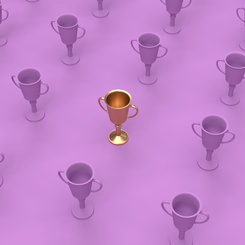With Marc Mazodier
Transcript
Julia Smith, editor-in-chief of ESSEC Knowledge: Hello and welcome to this episode of Be in the Know, the ESSEC Knowledge podcast sharing the research and expertise of ESSEC faculty. Today I’m talking to Marc Mazodier, professor of marketing and head of the marketing department, about his research on why advertisers should leverage major events in their marketing strategy. Marc, could you tell me a little bit about your research interests?
Marc Mazodier, professor of marketing and head of the marketing department: Hi, Julia, and thank you for the invitation. I'm very interested in marketing and communication strategies and specifically for major sporting events for a few reasons. First, I'm passionate about sports. Second, sporting events attract a massive audience. It's one of the rare opportunities for brands to reach this kind of massive audience nowadays. Research shows that actually, consumers pay more attention to commercials for major sporting events compared to other TV shows. Another reason is the fact that some consumers associate very positive attributes with this major sporting event that could be transferred to the brand thanks to these marketing communication strategies.
JS: It definitely seems like a great opportunity for marketing departments to leverage. So what were your main questions going into the study?
MM: Research shows that typical ads, which are ads representative of the product category, are usually the most performant. It’s a bit surprising because a lot of people assume creative ads are more performant. But actually, they forget the fact that most consumers are not interested in ads or commercials. Research shows that consumers gaze less than one second at online ads or outdoor ads, and less than 2 seconds at print ads. So it means that you have a short period of time to be able to communicate any message to consumers. So if you know that and so you have less than one second to attract attention and to communicate information to consumers, then you understand why one ad which is very representative of the product category is more performant, because then consumers know faster what these ads are.
However, I noticed that some brands were used to create ads that were typical of the event and not of the product category. So, for instance, I noticed some ads for the football World Cup, with football players playing football in the street, or on the football pitch, so the question was, what was the most performant? Is it one ad typical of the product category? Is it one ad typical of the event? Typical of both? Or atypical of both? And that's what we investigated.
JS: And how did you investigate this? What kind of factors did you take into account?
MM: So we decided to run lab experiments and also some field experiments. Because it's very challenging to actually control or manipulate the actual exposure to one ad. Here, we are interested in actual exposure, which is how long the eyes gaze at the ad. It's not just the opportunity to see. And it's not information you can collect easily from user-generated data or from secondary data, from Meta or Google. So to be able to control and actually to manipulate this duration, we decided to run experiments
JS: Very interesting, and with our short attention spans, as you say, and ads coming at us from all directions these days, it must be very challenging for advertisers to stand out. What were your main takeaways from this research? And do you have any tips for listeners in marketing?
MM: Sure, so at the beginning of this research project, we actually asked managers which ads, in their opinion, were the most performant: typical of the product category, typical of the event, typical of both or atypical of both. And actually, most managers thought the ads typical of both would be the most performant. So that's what we call a dual-typical ad. Which could make sense, because you can assume these ads should be able to cumulate the advantages of both ads: representative of the product category, so people know very quickly what it is, a car ad, or it is a cosmetics ad. And at the same time, as they know very quickly, that it could be one ad for this event, and able to transfer the positive attributes from the event to the brand. Which is great. But it doesn't work like that, because what we found and we replicated multiple times, is that actually, it's never the optimal type of ad, probably because it's too much information for consumers who have limited attention, who are not really interested and motivated to process the ad and actually, what we found is actually the most performant Ad is the ad Typical of the event During this event. So, bottom line, managers should create ads that are typical of the event using the most representative symbols of this event during the competition.
JS: Thank you. It's really useful to have a science-based strategy to stand out in a crowded market. And lastly, do you have any tips for businesses looking to do one last marketing push for the Olympics, and how they could leverage Paris 2024?
MM: So if they have not done it yet, they should definitely investigate which symbols are the most representative of the Olympics in Paris, whether it is a symbol of Paris, whether it's a symbol of the behavior of athletes. Of course they must find out which symbols are registered or not, because it's very important to know that there are many symbols that are registered. So of course you cannot use the Olympic rings, for instance, or there are many sentences that you cannot use. So it's very important to check the rules and regulations. But then, find the symbols that are unregistered and free, but very representative of the event, and this is the symbol that they should use for the next communication campaign for the Olympics.
JS: Thank you so much for these interesting insights and chatting with me today. I look forward to reading more of your research.
MM: Thank you, Julia.









